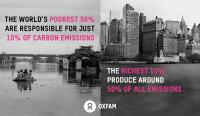Loneliness has become a genuine epidemic, not only among elderly people, but in all generations – an affliction responsible for grave mental and physical diseases. This epidemic is caused, according to George Monbiot, by a neoliberal economy and ideology which claims that people are greedy selfish creatures competing in a „war of all against all“. Social psychology, anthropology and evolutionary biology, however, tell us that the key values of human beings are a sense of community and altruism. The atomization of society is also creating the conditions for the resurgence of right-wing and fascist demagogues who promise community and coherence to people who feel disenfrachised, dispossessed and alienated.
George Monbiot, columnist with the Guardian und author of Heat: How to Stop the Planet Burning and Out of the Wreckage. A New Politics for an Age of Crisis
Fabian Scheidler: Welcome to Kontext TV, George Monbiot.
George Monbiot: Thanks very much, Fabian.
Fabian Scheidler: In your latest book you write “an epidemic of loneliness is sweeping the world." What do you mean by that and what does this have to do with our economic system?
George Monbiot: Well, it's a remarkable thing that in an age when we have 7 billion people on earth, many of those people have no one that can call a friend. And we see figures from many nations now showing that this affliction, this terrible disease of loneliness that was once believed to be confined to elderly people now affects people of every generation. And we also find at the same time that it has devastating consequences for both mental health and, it seems, for physical health as well. There is research suggesting that being chronically lonely is as bad for your physical health as smoking 15 cigarettes a day, twice as bad as obesity. It curtails your life expectancy, damages your general health, cardiovascular health and the rest. We cannot survive alone, and we do ourselves in if we try to live alone and yet we are pushed into loneliness by an alienating economic system which tells us that we are supposed to be alone. The dominant thought patterns of our age which can be brief roughly summarized as neoliberalism are built around the premise that human beings are fundamentally selfish, greedy, and at war with other human beings. They have a Hobbesian view of human life, which is that this is a war of all against all. It turns out to be completely false. Their view of human nature bears no relationship to what social psychology and anthropology and evolutionary biology tell us is how we actually behave, that while we all have a bit of selfishness and greed in us, our fundamental values are altruistic, benevolent, community-minded, family -minded - that those are the dominant values. Broadly speaking, we are a society of altruists governed by psychopaths. But we see ourselves differently and it slips into the language. You can't complete a sentence without saying the word personal as if we still trying to detach ourselves from the rest of life. Personally speaking, to distinguish myself from a ventriloquist dummy. I prefer personal friends to the impersonal variety and personal belongings to those that actually belong to me. But that's just my personal opinion, otherwise known as my opinion. We don’t talk about people anymore, we say individuals. An individual is walking down the street. We have this whole romantic lexicon of lone rangers and sole traders and self-made men and women. And so we drive ourselves into loneliness. Our economic system pushes it that way, the way we think about ourselves and it's based on these fundamentally mistaken premises. This is one aspect of the alienation, that sort of full-spectrum alienation that afflicts so many people.
Fabian Scheidler: In many countries we see extreme right wing movements and parties surging. In France as well as in the UK and Germany and Italy. In Brazil recently a fascist, Jair Bolsonaro, was elected as president. What does the rise of right-wing politics and right-wing demagogues have to do with neoliberalism and why don't we see as a response to 40 years of neoliberalism a switch to a progressive agenda instead?
George Monbiot: Well what neoliberalism does is to say, politics is in effect illegitimate, that the legitimate sphere for social change is what it calls the market, which really means economic power, and which is wielded disproportionately. Of course, those who sponsored the neoliberal agenda, the world's billionaires, love this idea that the only place where you can legitimately change the life of societies is through the sphere that they control And so as it has taken root, as it became the kind of political common sense adopted by formerly left-wing parties like Labour in the UK and the Democrats in the US as well as by the right, political choice gets shut down. The role of politicians becomes the role of managers of technocrats just managing society rather than trying to change society because it's not legitimate for politicians to change it. and so it cannot change social outcomes. Politics forbids itself to do so. The self hating state tries to shut down the scope of operations of the state and governance is no longer the aim of governments. So in that vacuum people look for alternatives and if politics as played out by the major parties in any nation is not providing those alternatives they will look elsewhere. And when people stand up and say well we’re above all that politics, we don’t do politics, all that yabber taking place above your head of the self-interested elites who aren’t interested in your life, we are going sweep all that aside, and we are going to make you feel good about yourselves, through the use of slogans and symbols and sensation. This is how fascism operates and it meets a need, it answers a need, this dispossession, this alienation, this disenfranchisement that people are feeling very deeply. It says we understand that we understand those feelings and here - we give you a community, a community of people just like you same color same slogans same music, if you can call it music, same marches, it creates coherence, where there is no coherency in your life. As Hannah Arendt pointed out, fascism is a response to atomization. When society is split apart when people don't have a sense of community, they look for community in these movements which offer very coherent form of community, wear the same uniforms for God's sake.
Fabian Scheidler: You say that neoliberalism is about getting rid of the state as governance. But at the same time, some parts of the state have become much more powerful like the military. Military spending is rising all over the planet authoritarian rule is rising, also in parts of Europe. Is it true that neoliberalism is really about getting rid of the state, or is it just changing what the state is doing?
George Monbiot: It is preventing the state from changing social outcomes, except where that might be able to provide more power and opportunities for those who already tremendously economically powerful, but in terms of redistribution of wealth and power from the rich and powerful to the poor and powerless, that is forbidden, that is where you cannot go. It's shutting down the key protective role of the state. The protective and redistributive role of the state. The provision of public services, the creation of a social safety net. Those are the things which get shut down, but as you quite rightly point out, the state becomes a vehicle for enhancing the power of industries, including the security industry which thrives in the situation of insecurity that neoliberalism creates and the fear, the paranoia that seems to run alongside it, but also many of the industries which a democratic system would effectively shut down, like fossil fuel industries today. Why are lignite like mine still being exploited in Germany, and why in in the UK we’re still subsidizing oil extraction? Well because the system is not working on behalf of citizens of our own countries or indeed the rest of the world, but instead is operating on behalf of tremendously powerful corporate and financial interests. And it's by shutting down those regulatory protective and redistributive functions of the state out that you open up space for antisocial industries and practices to operate. There is this phenomenon I call the pollution paradox, which applies particularly in countries like the US and the UK, where we have extremely weak rules on political funding. And the paradox goes as follows: It is the dirtiest companies, either literally in terms of those that produce the most pollution or in terms of corruption, in terms of antisocial financial practices, collateralized debt obligations and all the other exotic instruments. It is the dirtiest companies, which have the biggest interest in funding politics because those are the ones which would be shut out, of a proper functional democratic system because we just wouldn't accept the stuff that they are doing to us, we wouldn’t accept the levels of air pollution, which we’re being subject to, so they must buy their way out of democracy. So they’re the ones who spend the most on politics so politics then comes to dance to the tune of the dirtiest companies and they become dominant. And the clean companies get edged out because they're outcompeted by companies which are cutting their costs by being dirty. And so our politics come to be dominated by the most antisocial interests.





